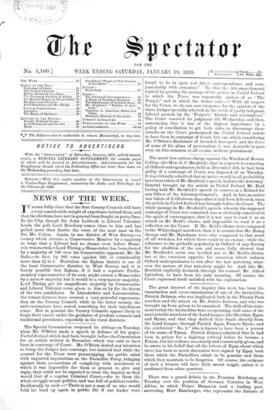There was a grand debate in the Prussian Reichstag on
Tuesday over the position of German Colonies in West Africa, in which Prince Bismarck took a leading part, answering Herr Bamberger, who represents the distaste of German Liberals for Colonial adventure. The Chancellor did not reveal any secrets, but he made some noteworthy remarks upon the subject of slavery. He desired to prevent the extension of that system, and to prohibit the slave- trade ; but he was not prepared to decree emancipation, and so " deprive hundreds of millions of the means of existence." Even England, he said, though she had put her hand in her pocket in a manner Germany could not do, had not succeeded, after a century of exertion, in suppressing slavery. That is partly true and partly false, for England has suppressed slavery in India -without -any -payments -at -all, and would suppress it in the Valley of the Nile if she reigned there ; but the sentence is ominous as to the action of Germany in East Africa. It will be most difficult to abolish the institu- tion if the European Governments are not agreed, and inter- national disputes about the rendition of slaves who have fled across the boundary will be almost endless. The Chancellor, in fact, explicitly recognises the "property of man in man" as something which is to continue in the German Colonies for an indefinite period—a view supported by German ex- plorers in public lectures in Berlin—and in so doing will take much heart out of the alliance between Germany and Britain in Africa. If Europe cannot terminate slavery there, her plea that she enters Africa to civilise becomes a rank pretence ; and, moreover, she sacrifices her best source of influence with the Negroes. It is not they, but the Arab invaders, who make a profit out of slavery.



































